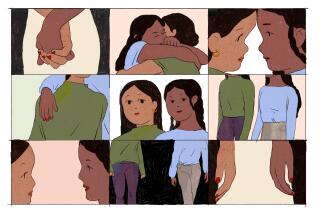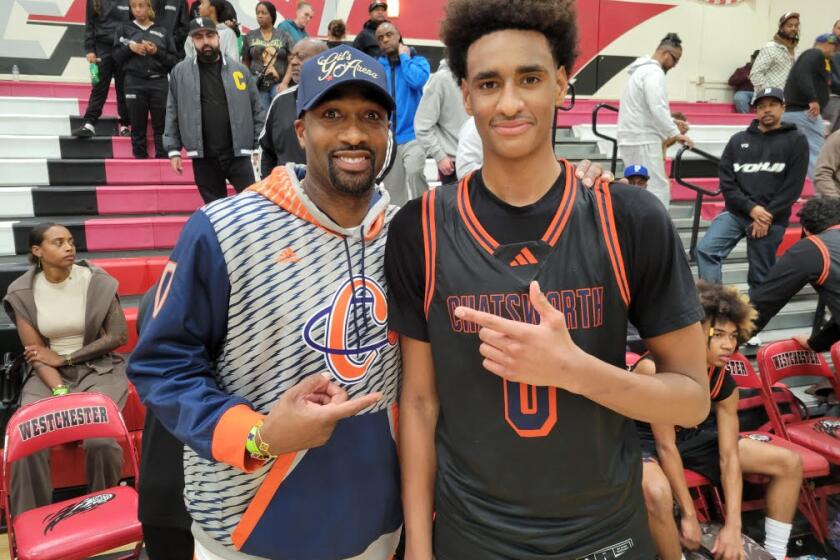Crawford High Sophomore Goes Full Speed Whether Racing or Just Working Out : He’s Out of Africa, but Tadese Is Still Running for His Life
SAN DIEGO — Running a mile may seem like a long way for some, but it beats running roughly 270 miles from communists for 18 days in the highlands of Ethiopia.
Maybe that’s why Goshu Tadese, a 17-year-old sophomore at Crawford High School, runs every mile for the track team like it’s his last.
“I don’t think he understands how to pace himself,” Tom Staninger, the Crawford distance coach, said. “He runs everything at full speed. He feels like he should never be in second. Even when we tell him to run warm-up laps, he’ll run them as fast as he can.”
He doesn’t understand when and what a runner should eat, either. Consider the day he ran a 1,600-meter relay leg and then went to a fast-food restaurant for a couple of hamburgers just a few minutes before running another 1,600 relay leg. His time was 4 minutes, 28 seconds, on the first leg and 4:30 on the second.
If Tadese has been slow to acclimate himself to the ways of American running and culture, it is understandable.
Only 3 1/2 years ago, Tadese had to worry about whether he would have enough food to eat. He had not even heard of distance-running countrymen like former Olympic 5,000- and 10,000-meter record-holder Miruts Yifter, who set both records in 1980, let alone considered himself ever having a chance to be one of the best young runners in San Diego County.
He placed fifth in the San Diego Section 2-A cross-country meet last fall and he already has one of the best mile times (4:33) in the county this season, but a college scholarship is still a vague concept to Tadese.
“This isn’t the average kid who goes home, sees his parents, watches television and goes to sleep,” Darryl Nelson, the Crawford head coach, said.
Goshu Tadese (pronounced Go-shoe Tuh-DESS-see) was born in the province of Wallo, which is northeast of the capital, Addis Ababa, in the central part of Ethiopia. His father was a lawyer in the small city of Walgtana, and the family (including his mother and five brothers) lived well by Ethiopian standards, which are not very high. The 1985 World Almanac lists the average annual income per household in Ethiopia as $117.
Goshu speaks proudly of his father, Wole. He smiles as he tells how his father fought as a guerilla against the “communists,” the ruling military junta that overthrew the democratic government in 1977 and is supported by the Soviet Union and Cuba.
Because of Wole’s action against the government, he was forced by local officials to leave the city. So Goshu, then 9, and his father fled the city, leaving their family in Walgtana. It is not clear why Goshu, rather than his brothers or mother, was chosen to accompany his father.
Goshu said, his father and he originally believed they could walk “two or three days” to the province of Bagemdar, and be safe.
It didn’t work out that way.
“The government kept finding us, so we had to keep going,” the younger Tadese said. “We slept in friends’ houses during the day, and then walk at night, when it was cool and dark.”
Eighteen days later, they found safety in a crowded refugee camp in the Sudan, roughly 270 miles west.
Ethiopia patrols its Sudanese border. Consequently, Goshu has not seen his mother or brothers in the eight years since he and his father fled.
Although reluctant to talk about life in the refugee camp, Goshu did say he worked in a restaurant to help support his father and himself.
The elder Tadese could not find work because of the lack of jobs for the thousands who had fled from Ethiopia to Sudanese camps because of drought and ensuing famine.
Goshu said “sometimes” there would be food and clothing brought to the camp.
Tadese said they were in the camp for 2 1/2 years while he and his father hoped to find a sponsor to bring them to the United States--or anywhere else.
At the end of 1982, Tadese and his father found a sponsor, whom Goshu knew only as “USCC,” that paid their air fare to the U.S. They spent five months in Kentucky, before the same sponsor paid their way to San Diego.
Said Goshu: “We had friends (from Ethiopia) who liked (Kentucky) so we went there. I didn’t like it. There’s a lot of snow in Kentucky. It’s nicer here.”
Tadese didn’t know any English when he came to San Diego three years ago, according to Linda Romano, who is in charge of the English-as-a-second-language courses at Horace Mann Junior High School, where Tadese went to eighth and ninth grade.
“Because there are not many Ethiopian students,” Romano said, “we cannot afford a teacher who speaks that language (Amharic). We use a lot of pictures and do a lot of pointing.
“Goshu was in the lowest level of ESL . . . (but) he made leaps and bounds. He had a natural tendency to pick up on things like slang quickly, which is much harder to learn. He was always very eager.
“He was one of those kids that sticks in your heart,” Romano said with a smile. “Even though I wasn’t his teacher, he’d always poke his head in to say hi.”
Getting used to U.S. culture was difficult for Tadese at first, William Olive, his shop teacher at Mann, said. The first thing Tadese made in his class was a clock in the shape of Ethiopia, Olive said.
“He had a rough time when he first got here. He had a superior attitude. (He may have been) trying to overcome his shortcomings and not being able to speak English. But boy he was proud of that clock,” Olive said.
“We had a rough go, because I couldn’t let him have the upper hand. But we worked together throughout the year and the young man turned around 180 degrees. I think we became fairly good friends.”
Learning to speak English wasn’t his only problem. Tadese also had to worry about money. Wole, 60, speaks only a few words of English and has had a difficult time getting a job because of his age and language problems. Consequently, the family had to go on welfare and Goshu had to go to work.
So Tadese, who now speaks English fairly well, has had to pitch in every way he can. Beginning last year, he began work at San Diego Jack Murphy Stadium as a vendor. He rode his bike about five miles from his home to the stadium. Nelson said Tadese still works at the stadium, puts flyers on cars, anything to earn money.
Tadese said he earns enough, along with the welfare payments, so he and his father can make ends meet. But Tadese said the welfare payments will run out in about eight months.
“He doesn’t know what they’ll do after that,” a friend said.
When asked about having to work, Tadese just smiles and shrugs.
About the same time he started working, Tadese was introduced to running in ninth-grade physical education classes at Mann. He started by setting a record (5:08.6) for the mile in the school’s pentathlon competition.
“He was a tireless runner, a natural-born runner,” Wendy Wangsgard, his physical education teacher, said.
Physical education teacher Ron Lingle told Nelson, who also coaches cross-country, of Tadese, and Lingle signed him up for the team. Nelson said he remembers the first time Tadese came out for cross-country.
“It was about a week into the season,” Nelson said. “After four days of workouts, we put him in the sophomore (3.1-mile) race at the South Bay Invitational. He went out and ran 5:05 the first mile. We were wondering when he was gonna die.
“He won the race by a quarter-mile and got a medal. He asked, ‘When’s the next sophomore race?’ I told him, ‘You’re running in the varsity races now.’ ”
But, even now, Tadese does not put in a lot of mileage. While most high school distance runners average 45 miles per week, Tadese averages 25.
Nelson said Tadese is not lazy, he just doesn’t have the time.
“He works at least two or three afternoons a week,” Nelson said. “He does anything he can (to earn money).”
In fact, Tadese has had to miss meets because of work.
“I think he sees running as a play thing. It’s real difficult for him to relate this to the future . . . that he could wind up getting a college scholarship. He needs to see he has true natural ability.”
When asked about his college plans, and what he might want to do after college, Tadese just looked away, keeping the same pleasant look on his face.
He wasn’t being rude. He just had a few other things to worry about before he could think of college.
More to Read
Get our high school sports newsletter
Prep Rally is devoted to the SoCal high school sports experience, bringing you scores, stories and a behind-the-scenes look at what makes prep sports so popular.
You may occasionally receive promotional content from the Los Angeles Times.






